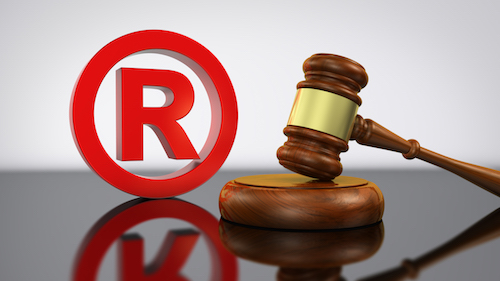From Brunetti to Lucky Brand Dungarees, here are the trademark cases that will impact IP practice this year.
 Two things are true about the world of trademarks—it is rarely boring, and something is always on the horizon.
Two things are true about the world of trademarks—it is rarely boring, and something is always on the horizon.
The following are some of the significant trademark decisions of 2019, as well as two critical cases to watch as 2020 begins:
1. The Supreme Court’s ruling in Iancu v. Brunetti rejected the Lanham Act’s ban on offensive marks on the grounds that such a ban violates the First Amendment Right of Free Speech. The case involved clothing brand FUCT, which stands for “Friends You Can’t Trust,” and its founder, Erik Brunetti, who sought to register the brand’s name with the U.S. Patent and Trademark Office (USPTO). The USPTO refused to register the name, determining it was immoral and scandalous. Brunetti argued to the Trademark Trial and Appeal Board (TTAB) that the mark was not vulgar, and that Section 2(a) of the Lanham Act was unconstitutional because it violated the First Amendment. However, the TTAB affirmed the USPTO’s refusal and Brunetti appealed to the U.S. Court of Appeals for the Federal Circuit (CAFC).
The CAFC found that the USPTO decision to bar Brunetti’s trademark registration was unconstitutional on free speech grounds. The Supreme Court granted certiorari to determine the validity of Section 2(a) and decided 6-3 that the Lanham Act’s bar on immoral or scandalous marks is viewpoint discrimination rather than viewpoint neutral and is thus unconstitutional. The Iancu v. Brunetti ruling essentially does for offensive trademarks what the Supreme Court’s 2017 Matal v. Tam ruling did for trademarks that disparage particular groups.
2. In Mission Product Holdings, Inc. v. Tempnology, LLC, the Supreme Court ruled that a trademark licensee does not lose all rights to use a licensed trademark when the licensor declares bankruptcy and rejects the contract. The court’s decision means that a licensor’s rejection of a trademark license constitutes a contract breach, but it does not end the licensee’s rights to use the trademark.
Mission Product Holdings held a license to use Tempnology’s “Coolcore” trademarks. When Tempnology filed for Chapter 11 bankruptcy, it attempted to reject the license with Mission. The First Circuit Court of Appeals ruled that the company was within its rights to reject the license, especially since allowing the license to continue would place a burden on Tempnology to monitor its marks and licenses after bankruptcy. However, the Supreme Court sided with Mission stating that a declaration of bankruptcy and subsequent rejection of a contract does not mean that the licensee loses all rights to use a licensed trademark.
Since non-debtor licensees retain some rights post rejection, this ruling may affect the way practitioners draft trademark licensees in anticipation of bankruptcy.
3. A regional retail chain scored a nearly nine-figure trademark infringement verdict against Walmart.
In the North Carolina case of Variety Stores v. Walmart, Variety Stores Inc. (which operates the Roses and Maxway discount stores in the South), sued the retail giant over Walmart’s use of the “Backyard Grill” brand. Variety said it had used the “Backyard” trademark for its lawn, garden and outdoor grilling products for nearly 30 years.
A U.S. District Court for the Eastern District of North Carolina jury awarded Variety more than $95.5 million in February, after finding in late 2018 that Walmart had willfully infringed the trademark.
Ironically, the jury verdict came a few months after the Fourth Circuit overturned the District Court judge’s $32.5 million ruling in favor of Variety, stating that the case should have gone to a jury.
4. Another retail battle involved Tiffany’s ongoing trademark dispute against Costco. In January, a District Court for the Southern District of New York judge rejected Costco’s request to overturn Tiffany & Co’s $21 million verdict in the case of Tiffany & Co. v. Costco Wholesale Corp.
The lawsuit alleges that Costco violated Tiffany’s trademark by using “Tiffany” signage to promote the store’s diamond ring collection. Costco claimed that the usage was simply a reference to “Tiffany setting,” a generic jewelry industry term, but the federal court rejected that defense. The judge in the case ruled that not only did Costco violate Tiffany’s trademark, but that the retailer also engaged what amounts in counterfeiting by doing so.
Costco is appealing that decision to the Second Circuit, and a decision should be forthcoming in 2020.
5. Next up on the Supreme Court’s agenda is determining if a finding of willfulness is required to obtain an aware of profits in trademark infringement litigation.
Early this month, the Supreme Court heard arguments in Romag Fasteners Inc. v. Fossil Inc. At one point, Romag supplied magnetic fasteners for use in Fossil’s popular line of handbags. These fasteners were supposed to be sourced from Romag’s authorized manufacturer in China. However, Fossil allegedly used counterfeit parts from a different manufacturer. A U.S. District Court ruled in 2014 that Fossil infringed Romag’s trademarks. Since then, the two parties have battled over $6.8 million in profits that Romag says it is entitled to, even though Fossil’s infringement was ruled to be not willful.
At issue now is whether the infringement must be willful in order for plaintiffs to request the forfeiture of profits—perhaps the most serious penalty in trademark infringement litigation. Since courts have ruled differently, the hope is that the Supreme Court’s decision will resolve the circuit split.
6. The Supreme Court heard oral arguments mid-January in Lucky Brand Dungarees, Inc. et al. v. Marcel Fashion Group, Inc. Of particular interests to trademark observers will be the issue of claim preclusion for a trademark settlement agreement.
The roots of this case go all the way back to 2001, when Marcel sued Lucky Brand, claiming the jeans manufacturer infringed on Marcel’s “Get Lucky” trademark. That case was settled two years later, with Lucky Brand ceasing to use the “Get Lucky” trademark and Marcel releasing certain claims arising from the use of its trademarks.
But since then, Lucky Brand has accused Marcel of violating the terms of that settlement by granting another company the licenses to use the “Get Lucky” trademark. However, in 2005, a U.S. District Court enjoined Lucky Brand from using the “Get Lucky” mark.
The dispute between the two companies erupted again in 2011, with Marcel again claiming that Lucky Brand had infringed its trademark rights. The Supreme Court will decide whether Lucky Brand can raise a defense centering on the release agreement that was not brought up in the prior litigation.
Looking Ahead
While we await decisions in the latter two cases, it goes without saying that additional significant trademark actions will make their way through the courts. In the world of trademark law, the one guarantee is that every new year will be a noteworthy one.
Image Source: Deposit Photos
Image ID: 188971134
Copyright: NiroDesign

![[IPWatchdog Logo]](https://ipwatchdog.com/wp-content/themes/IPWatchdog%20-%202023/assets/images/temp/logo-small@2x.png)

![[Advertisement]](https://ipwatchdog.com/wp-content/uploads/2024/04/Patent-Litigation-Masters-2024-sidebar-early-bird-ends-Apr-21-last-chance-700x500-1.jpg)

![[Advertisement]](https://ipwatchdog.com/wp-content/uploads/2021/12/WEBINAR-336-x-280-px.png)
![[Advertisement]](https://ipwatchdog.com/wp-content/uploads/2021/12/2021-Patent-Practice-on-Demand-recorded-Feb-2021-336-x-280.jpg)
![[Advertisement]](https://ipwatchdog.com/wp-content/uploads/2021/12/Ad-4-The-Invent-Patent-System™.png)







Join the Discussion
No comments yet.